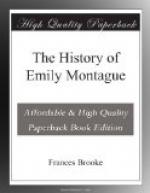Adieu! I am fatigued; we danced till morning; I am but this moment up.
Yours,
A.
Fermor.
Your brother danced with Mademoiselle Clairaut; do you know I was piqued he did not give me the preference, as Emily danced with her lover? not but that I had perhaps a partner full as agreable, at least I have a mind to think so.
I hear it whispered that the whole affair of the wedding is to be settled next week; my father is in the secret, I am not. Emily looks ill this morning; she was not gay at the ball. I know not why, but she is not happy. I have my fancies, but they are yet only fancies.
Adieu! my dear girl; I can no more.
LETTER 26.
To Miss Rivers, Clarges Street.
Quebec, Oct. 6.
I am going, my Lucy.—I know not well whither I am going, but I will not stay to see this marriage. Could you have believed it possible—But what folly! Did I not know her situation from the first? Could I suppose she would break off an engagement of years, with a man who gives so clear a proof that he prefers her to all other women, to humor the frenzy of one who has never even told her he loved her?
Captain Fermor assures me all is settled but the day, and that she has promised to name that to-morrow.
I will leave Quebec to-night; no one shall know the road I take: I do not yet know it myself; I will cross over to Point Levi with my valet de chambre, and go wherever chance directs me. I cannot bear even to hear the day named. I am strongly inclined to write to her; but what can I say? I should betray my tenderness in spite of myself, and her compassion would perhaps disturb her approaching happiness: were it even possible she should prefer me to Sir George, she is too far gone to recede.
My Lucy, I never till this moment felt to what an excess I loved her.
Adieu! I shall be about a fortnight absent: by that time she will be embarked for England. I cannot bring myself to see her the wife of another. Do not be alarmed for me; reason and the impossibility of success will conquer my passion for this angelic woman; I have been to blame in allowing myself to see her so often.
Yours,
Ed.
Rivers.
LETTER 27.
To Miss Rivers, Clarges Street.
Beaumont, Oct. 7.
I think I breathe a freer air now I am out of Quebec. I cannot bear wherever I go to meet this Sir George; his triumphant air is insupportable; he has, or I fancy he has, all the insolence of a happy rival; ’tis unjust, but I cannot avoid hating him; I look on him as a man who has deprived me of a good to which I foolishly fancy I had pretensions.
My whole behaviour has been weak to the last degree: I shall grow more reasonable when I no longer see this charming woman; I ought sooner to have taken this step.




